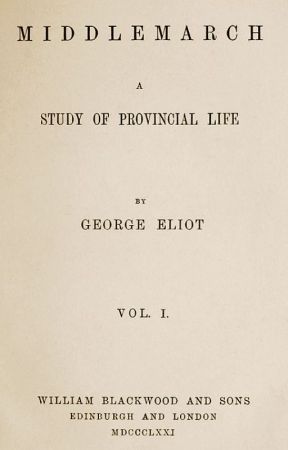"Qui veut delasser hors de propos, lasse."--PASCAL.
Mr. Casaubon had no second attack of equal severity with the first,
and in a few days began to recover his usual condition.
But Lydgate seemed to think the case worth a great deal of attention.
He not only used his stethoscope (which had not become a matter
of course in practice at that time), but sat quietly by his patient
and watched him. To Mr. Casaubon's questions about himself,
he replied that the source of the illness was the common error
of intellectual men--a too eager and monotonous application:
the remedy was, to be satisfied with moderate work, and to seek
variety of relaxation. Mr. Brooke, who sat by on one occasion,
suggested that Mr. Casaubon should go fishing, as Cadwallader did,
and have a turning-room, make toys, table-legs, and that kind
of thing.
"In short, you recommend me to anticipate the arrival of my
second childhood," said poor Mr. Casaubon, with some bitterness.
"These things," he added, looking at Lydgate, "would be to me such
relaxation as tow-picking is to prisoners in a house of correction."
"I confess," said Lydgate, smiling, "amusement is rather
an unsatisfactory prescription. It is something like telling
people to keep up their spirits. Perhaps I had better say,
that you must submit to be mildly bored rather than to go on working."
"Yes, yes," said Mr. Brooke. "Get Dorothea to play backgammon with
you in the evenings. And shuttlecock, now--I don't know a finer game
than shuttlecock for the daytime. I remember it all the fashion.
To be sure, your eyes might not stand that, Casaubon. But you
must unbend, you know. Why, you might take to some light study:
conchology, now: it always think that must be a light study.
Or get Dorothea to read you light things, Smollett--'Roderick Random,'
'Humphrey Clinker:' they are a little broad, but she may read
anything now she's married, you know. I remember they made me
laugh uncommonly--there's a droll bit about a postilion's breeches.
We have no such humor now. I have gone through all these things,
but they might be rather new to you."
"As new as eating thistles," would have been an answer to represent
Mr. Casaubon's feelings. But he only bowed resignedly, with due
respect to his wife's uncle, and observed that doubtless the works
he mentioned had "served as a resource to a certain order of minds."
"You see," said the able magistrate to Lydgate, when they were
outside the door, "Casaubon has been a little narrow: it leaves him

YOU ARE READING
MIDDLEMARCH (Completed)
ClassiciMiddlemarch, A Study of Provincial Life is a novel by the English author George Eliot, first published in eight installments (volumes) during 1871-72. The novel is set in the fictitious Midlands town of Middlemarch during 1829-32, and it comprises...
